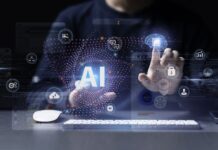By Duncan Tait
With the advancements in technology reaching their peak, we can see how powerful such disruptions are in upending our lives and the business processes in organisations, both in public and private sectors. What is needed now is to not just succeed in adapting to the ever-changing business landscape but also to thrive. In order to do so, we need to realise the importance of collaboration among and with technology experts across industries.
Whether we are talking about artificial intelligence, 5G connectivity or blockchain, recent advancements in technology have drastically changed not only how businesses operate, but also the way in which people live. Industries from retail to automotive are perfect examples of the disruption that is taking place on a large scale. For example, Amazon’s Prime delivery service has created a unique culture of immediacy that shoppers expect as the new normal, while Elon Musk’s commitment to making autonomous vehicles an everyday reality is set to change the future of driving.
However, whether digital innovations such as these are commonplace or emerging, business leaders cannot afford to be blinded by the promise of new revenue opportunities, unparalleled efficiency gains and the digital-first workplace of the future. It is up to business leaders and governments to ensure that new technology solutions are also designed with a greater purpose at their core: to improve the world around us.
Therefore, how can we as IT leaders extend the benefits of technology to the masses and guarantee that disruption creates a positive change? It comes down to three core elements: cross-company collaboration; building solid IT skills across the workforce; and ensuring that AI and machine learning are embraced in a way that completes, not replaces, everyday employees.
Building a shared future in today’s fractured world
Last year, our Digital PACT research uncovered the concerns and aspirations of leading global businesses. Crucially, it found that 52% of business leaders believe their organisation will not exist in its current form in five years’ time. It also found that collaboration – one of four vital pillars to successful digital transformation – is becoming increasingly important as a tool to support business success, with 63% of business leaders already undertaking or planning co-creation projects.
The importance of fostering collaboration was also recognised at this year’s World Economic Forum (WEF) at Davos, with the central theme focussing on “Creating a Shared Future in a Fractured World”. Our recent Timeline 2030 research highlighted that an overwhelming 84% of business leaders believe we need a co-ordinated global response to the change that we’re experiencing as a result of new technologies, such as AI, IoT and mobile computing.
However, 76% of business leaders also feel that governments are not doing enough to prepare for the disruptive impact of technology. This level of disparity should be of concern; without both public and private organisations making an effort to work together, the challenge of adapting to and benefiting from new technology will be much harder.
Automation can be a force for good, but we have to address the risks
Companies of every shape and size are racing to deploy artificial intelligence (AI). Yet, with machine learning applications already making a real difference in a number of industries, the debate is still raging over the trade-off between efficiency gains and the impact on everyday workers.
Our Timeline 2030 research investigated the threats and opportunities that AI and automation pose for both companies and employees, and revealed some interesting findings. Rather than erasing humans from the equation – as some alarmists have claimed will be the reality – AI’s value will lie in its ability to empower people. From connected factories to automated accountancy, AI can save people from repetitive and routine work, freeing up their time for higher-value tasks and projects. For example, at Fujitsu we are trialling robotic process automation in our Social Command Center (SCC), implementing AI and voice biometrics to build a system that can solve everything from forgotten passwords to IT issues. This gives our IT teams more bandwidth to work on strategic projects rather than attending to minor technology issues.
Further to simply alleviating the tedium of manual or repetitive tasks, AI can provide workers with extra decision-making support. For example, law firms are already using AI to sift through the mountains of paperwork to pinpoint crucial contract information, or to categorise data in a way that streamlines their work. We recently worked with San Carlos Hospital to develop a machine learning solution that accessed, grouped and anonymised data obtained from clinical and non-clinical sources. The solution more than halved the time needed for clinicians to pre-screen patient records, and accelerated the time taken to identify and diagnose depression or suicide. By doing away with time-intensive tasks, AI can allow workers to focus on more valuable and complex aspects of their day job.
When presented with these AI opportunities, businesses still need to apply a level of caution in their approach. IT leaders must take a responsible approach to AI and automation, ensuring they put people first. The objective is to create a business ecosystem that runs on growth and development, rather than retrenchments and uncertainty.
Great technology depends on great skills
There is no denying that for us to be able to embrace innovative new technologies, we need to invest time and resources in STEM (Science, Technology, Engineering and Math) education. Without a skilled workforce, we will never be able to develop the innovation needed to build upon existing technology, such as IoT and AI, or more importantly, create the new technology of the future. To achieve this requires more collaboration between IT companies, governments and educational institutions. All three must work together to provide the education and training needed to develop the next generation of IT experts. While STEM skills are crucial, so-called “soft” skills are equally important. A European Commission report on the future of work noted that employers are increasingly demanding soft skills such as emotional and psychological intelligence. It also found that possessing these skills was consistent with wage growth – evidently, we cannot ignore either skillset if we are to both close the skills gap and create a thriving environment for the future. Collaboration will cement the workplace of tomorrow As industries become increasingly interlinked, creating a sustainable future for both companies and their employees will come down to business leaders’ ability to recognise and respond to the disruptive nature of technology. It will be crucial to look to other organisations for opportunities to collaborate, and ensure that employees are equipped with the skills to thrive in the technology-driven workplace of tomorrow. By connecting collaborative ideas, core IT skills across the workforce and logical AI-driven processes, we can work together to create a prosperous society.
About the Author Duncan Tait is CEO, SEVP and Head of Americas and EMEIA at Fujitsu with more than 27 years’ experience in the ICT industry. His deep business and industry knowledge and global perspective are critical assets that enable Fujitsu to achieve its mission: to use technology to improve global business and society.
Duncan Tait is CEO, SEVP and Head of Americas and EMEIA at Fujitsu with more than 27 years’ experience in the ICT industry. His deep business and industry knowledge and global perspective are critical assets that enable Fujitsu to achieve its mission: to use technology to improve global business and society.



































